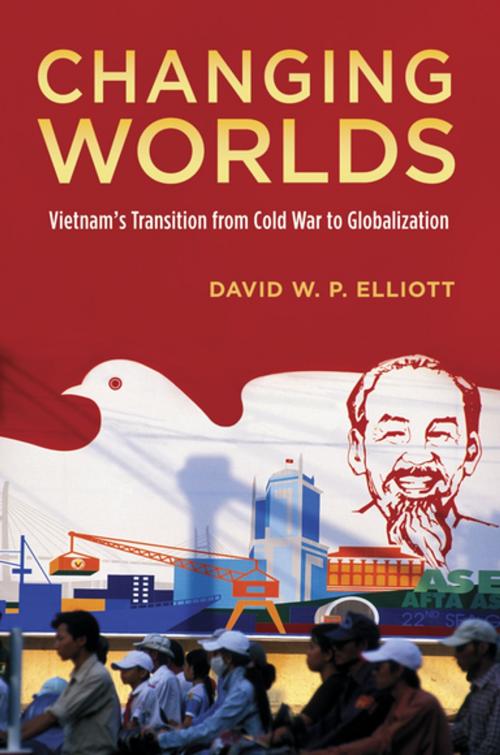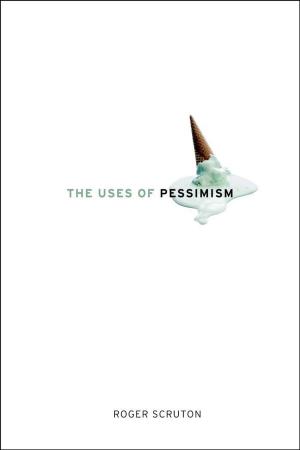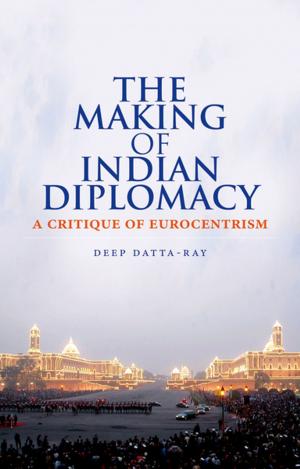Changing Worlds
Vietnam's Transition from Cold War to Globalization
Nonfiction, Social & Cultural Studies, Political Science, International, Foreign Legal Systems, International Relations| Author: | David W.P. Elliott | ISBN: | 9780199996087 |
| Publisher: | Oxford University Press | Publication: | September 3, 2012 |
| Imprint: | Oxford University Press | Language: | English |
| Author: | David W.P. Elliott |
| ISBN: | 9780199996087 |
| Publisher: | Oxford University Press |
| Publication: | September 3, 2012 |
| Imprint: | Oxford University Press |
| Language: | English |
Throughout the entire Cold War era, Vietnam served as a grim symbol of the ideological polarity that permeated international politics. But when the Cold War ended in 1989, Vietnam faced the difficult task of adjusting to a new world without the benefactors it had come to rely on. In Changing Worlds, David W. P. Elliott, who has spent the past half century studying modern Vietnam, chronicles the evolution of the Vietnamese state from the end of the Cold War to the present. When the communist regimes of Eastern Europe collapsed, so did Vietnam's model for analyzing and engaging with the outside world. Fearing that committing fully to globalization would lead to the collapse of its own system, the Vietnamese political elite at first resisted extensive engagement with the larger international community. Over the next decade, though, China's rapid economic growth and the success of the Asian "tiger economies," along with a complex realignment of regional and global international relations reshaped Vietnamese leaders' views. In 1995 Vietnam joined the Association of Southeast Asian Nations (ASEAN), its former adversary, and completed the normalization of relations with the United States. By 2000, Vietnam had "taken the plunge" and opted for greater participation in the global economic system. Vietnam finally joined the World Trade Organization in 2006. Elliott contends that Vietnam's political elite ultimately concluded that if the conservatives who opposed opening up to the outside world had triumphed, Vietnam would have been condemned to a permanent state of underdevelopment. Partial reform starting in the mid-1980s produced some success, but eventually the reformers' argument that Vietnam's economic potential could not be fully exploited in a highly competitive world unless it opted for deep integration into the rapidly globalizing world economy prevailed. Remarkably, deep integration occurred without Vietnam losing its unique political identity. It remains an authoritarian state, but offers far more breathing space to its citizens than in the pre-reform era. Far from being absorbed into a Western-inspired development model, globalization has reinforced Vietnam's distinctive identity rather than eradicating it. The market economy led to a revival of localism and familism which has challenged the capacity of the state to impose its preferences and maintain the wartime narrative of monolithic unity. Although it would be premature to talk of a genuine civil society, today's Vietnam is an increasingly pluralistic community. Drawing from a vast body of Vietnamese language sources, Changing Worlds is the definitive account of how this highly vulnerable Communist state remade itself amidst the challenges of the post-Cold War era.
Throughout the entire Cold War era, Vietnam served as a grim symbol of the ideological polarity that permeated international politics. But when the Cold War ended in 1989, Vietnam faced the difficult task of adjusting to a new world without the benefactors it had come to rely on. In Changing Worlds, David W. P. Elliott, who has spent the past half century studying modern Vietnam, chronicles the evolution of the Vietnamese state from the end of the Cold War to the present. When the communist regimes of Eastern Europe collapsed, so did Vietnam's model for analyzing and engaging with the outside world. Fearing that committing fully to globalization would lead to the collapse of its own system, the Vietnamese political elite at first resisted extensive engagement with the larger international community. Over the next decade, though, China's rapid economic growth and the success of the Asian "tiger economies," along with a complex realignment of regional and global international relations reshaped Vietnamese leaders' views. In 1995 Vietnam joined the Association of Southeast Asian Nations (ASEAN), its former adversary, and completed the normalization of relations with the United States. By 2000, Vietnam had "taken the plunge" and opted for greater participation in the global economic system. Vietnam finally joined the World Trade Organization in 2006. Elliott contends that Vietnam's political elite ultimately concluded that if the conservatives who opposed opening up to the outside world had triumphed, Vietnam would have been condemned to a permanent state of underdevelopment. Partial reform starting in the mid-1980s produced some success, but eventually the reformers' argument that Vietnam's economic potential could not be fully exploited in a highly competitive world unless it opted for deep integration into the rapidly globalizing world economy prevailed. Remarkably, deep integration occurred without Vietnam losing its unique political identity. It remains an authoritarian state, but offers far more breathing space to its citizens than in the pre-reform era. Far from being absorbed into a Western-inspired development model, globalization has reinforced Vietnam's distinctive identity rather than eradicating it. The market economy led to a revival of localism and familism which has challenged the capacity of the state to impose its preferences and maintain the wartime narrative of monolithic unity. Although it would be premature to talk of a genuine civil society, today's Vietnam is an increasingly pluralistic community. Drawing from a vast body of Vietnamese language sources, Changing Worlds is the definitive account of how this highly vulnerable Communist state remade itself amidst the challenges of the post-Cold War era.















